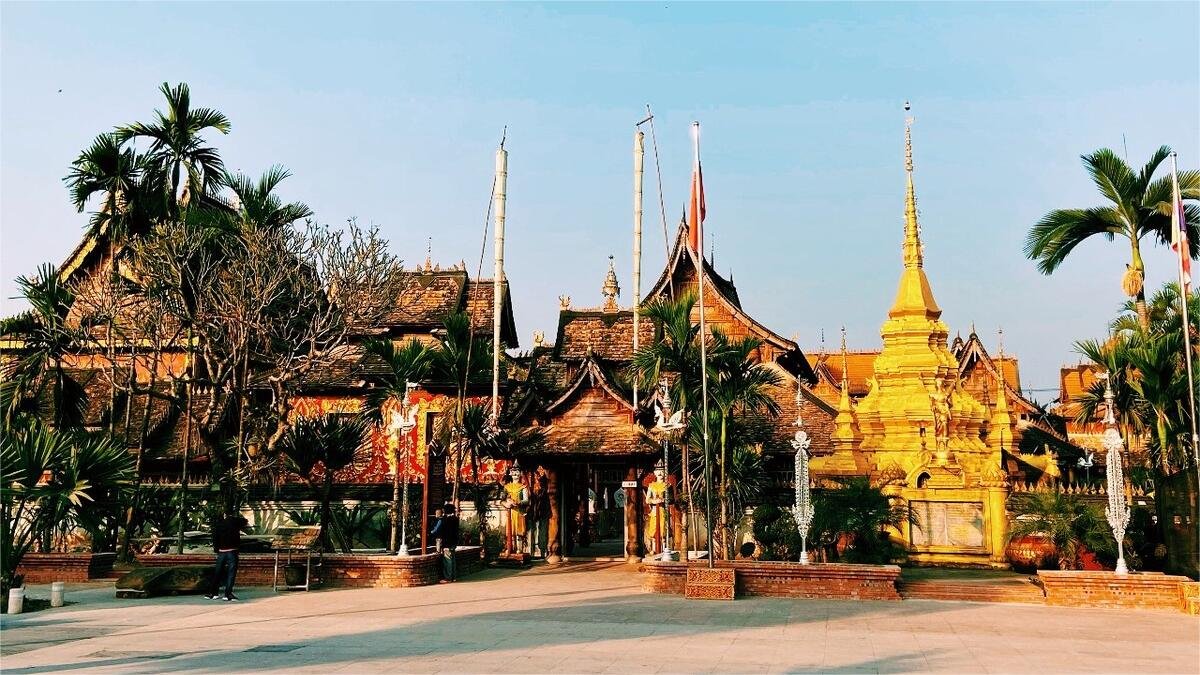Manchunman Buddhist Temple (曼春满佛寺), also known as Menghan Chunman Grand Buddhist Temple (勐罕春满大佛寺), is located in the Dai Minority Park. The existing structures date back to the Qing Dynasty. According to legend, Manchunman Buddhist Temple is the first temple built after Buddhism was introduced to Xishuangbanna. It was supposedly constructed by Dikaban Yue, a Blang disciple of Shakyamuni Buddha, in the Buddhist year 1126 (583 CE), giving it a history of over 1400 years. Another account suggests that the temple was founded in the sixth year of Emperor Qianlong’s reign (1741) during the Qing Dynasty. Before the temple’s construction, Dikaban Yue entered Jinghong via Myanmar and began preaching in Menghan. At that time, there were no Buddhist temples in what is now the Xishuangbanna region, so he built Manchunman Buddhist Temple through alms collection.
Manchunman Buddhist Temple enjoys great fame throughout Southeast Asia. During major Buddhist ceremonies each year, monks and devout followers from Sri Lanka, Thailand, Myanmar, Laos, and various parts of Xishuangbanna gather at Manchunman Buddhist Temple for worship and chanting activities. Consequently, the temple is bustling with religious activity and fervent devotion. The temple’s vibrant incense offerings, its pagodas, the ethereal incense smoke, and the chanting of young monks add to the tranquil and mystical ambiance of the site.
Table of Contents
- Basic Information
- Location and Transportation
- Highlights of Manchunman Buddhist Temple
- Vlog about Manchunman Buddhist Temple
Basic Information
| Estimated Length of Tour | 0.5 – 1 hour |
| Ticket Price | Included in the ticket for Xishuangbanna Dai Ethnic Park |
| Opening Hours | 8.00 – 18.00 |
| Telephone Number | 0086-0691-2504601 |
Location and Transportation
Manchunman Buddhist Temple is located on the west side of Manchunman Village in Menghan Town (also known as Ganlanba), Jinghong City, Xishuangbanna Dai Autonomous Prefecture, Yunnan Province, China. Visitors can reach the temple by taking a bus from the Banna Bus Station in Jinghong City to the Ganlanba (Menghan Town) Bus Station, which costs around 10 yuan per person. From the Ganlanba Bus Station, it is approximately a 10-minute walk to Manchunman Buddhist Temple.
Highlights of Manchunman Buddhist Temple
Main Entrance
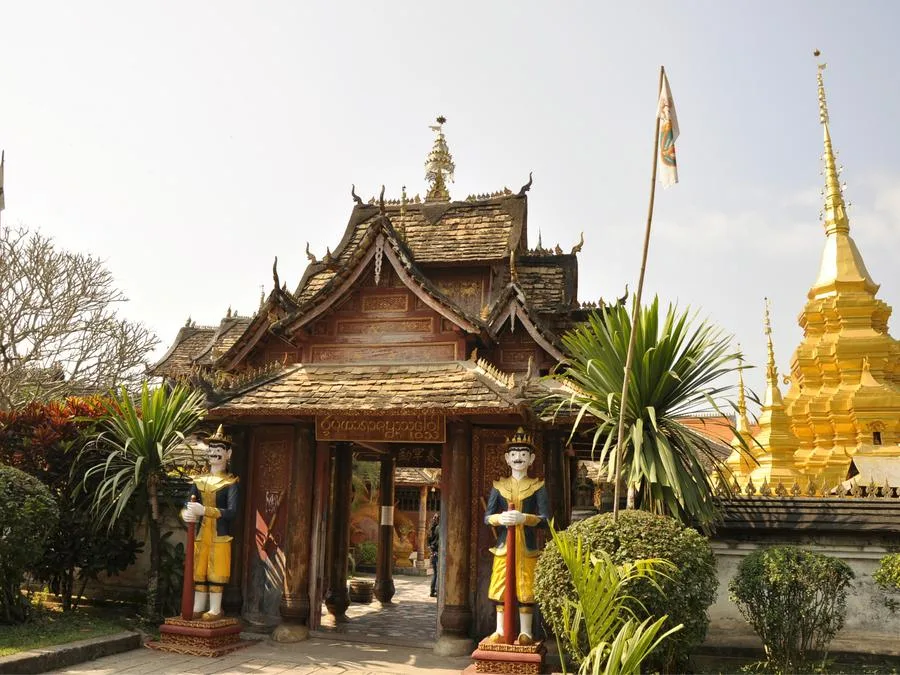
Manchunman Buddhist Temple features two unique gates. The main gate is a three-tiered structure adorned with sculptures of auspicious birds. On either side of the gate, there are sculptures of guardians holding wooden sticks. The gate’s header displays the name “Menghan Manchunman Grand Buddha Temple” in both Dai and Chinese script. The secondary gate is designed in the shape of a pagoda, which is quite distinctive among various Buddhist sects. Above this gate is a carving of a peacock with its feathers fanned out, and in front of the gate stand two stone guardian beasts called “Laga” in the Dai language.
Grand Hall
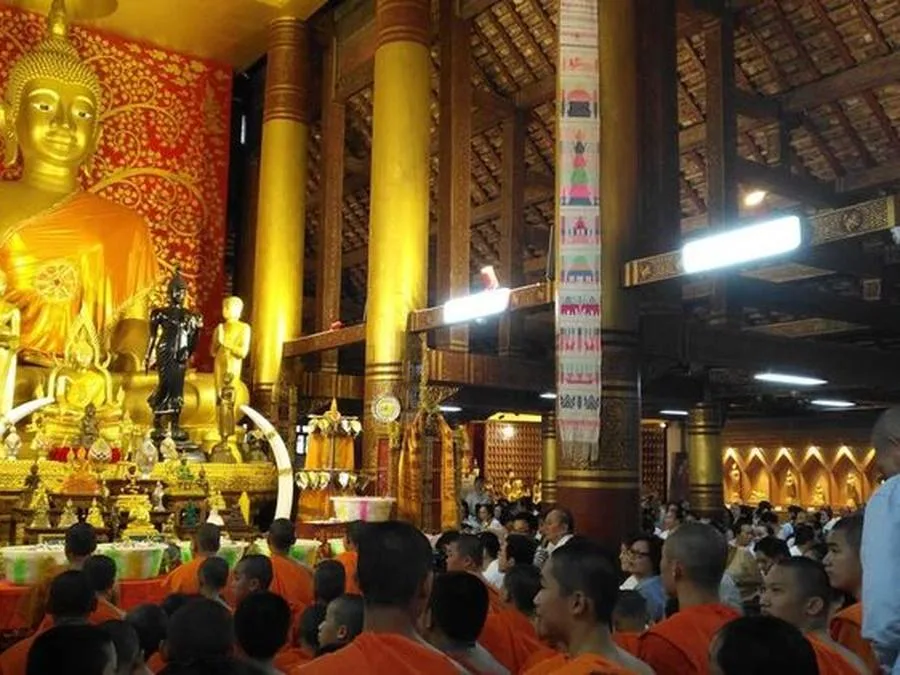
Located directly in front of the main entrance, the grand hall is the centerpiece of the temple complex. The hall is spacious and majestic, with its lavish gold decorations exuding a sense of grandeur. Covering an area of 490 square meters, it measures 23.5 meters in length and 21 meters in width, forming a rectangular shape. Inside, 44 red cylindrical pillars, each adorned with gold powder designs, stand on either side of the hall. These pillars, with diameters ranging from 0.4 meters to 0.6 meters and heights of up to 12 meters, contribute to the hall’s imposing presence. Shorter pillars, measuring four to five meters, are also present.
The centerpiece of the main hall is a magnificent statue of Shakyamuni Buddha, standing over four meters tall. In front of this grand statue, there are five smaller Buddha statues arranged in a row. The hall also features hanging banners and a raised platform for monks to sit and chant scriptures. The combination of the hall’s size, the ornate decorations, and the statues creates an atmosphere of reverence and splendor.
Manchunman Golden Pagoda
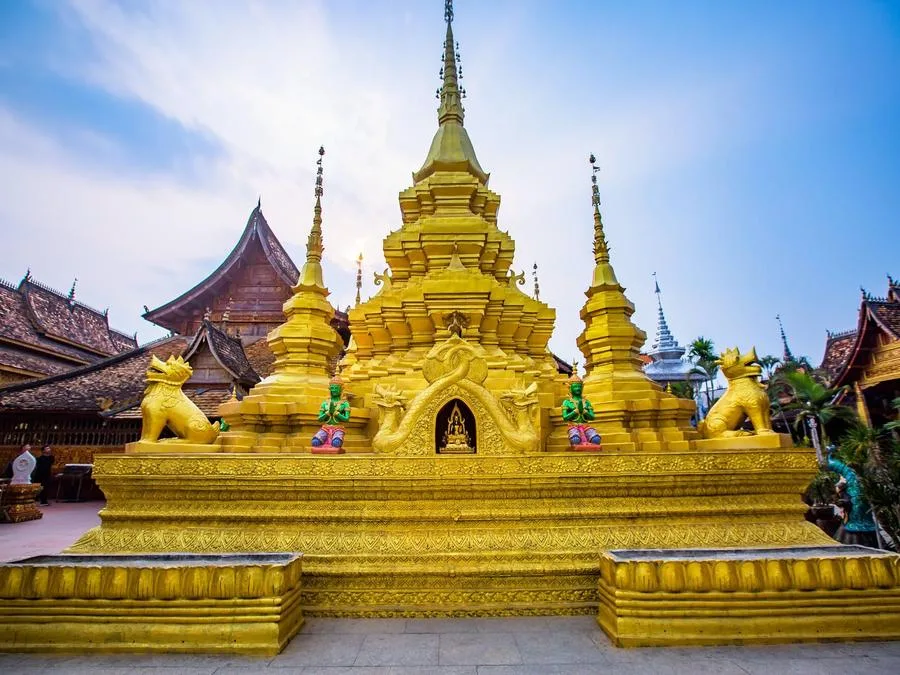
The Manchunman Golden Pagoda is situated on the northwest side of Manchunman Buddhist Temple. This pagoda complex, likely built during the same period as the temple, consists of five pagodas – one large central pagoda flanked by four smaller ones – standing on a square base. The main pagoda stands approximately 12 meters tall and features a multi-tiered, “亞”-shaped base. The structure of the pagoda includes a bell-shaped body topped with a spire composed of a circular lotus platform, a series of rings, a decorative umbrella, and silver bells. Each of the smaller pagodas has a Buddha niche at its base. Around the base of the main pagoda are stone carvings of mythical guardian beasts known as “Laga.”
Drum Tower
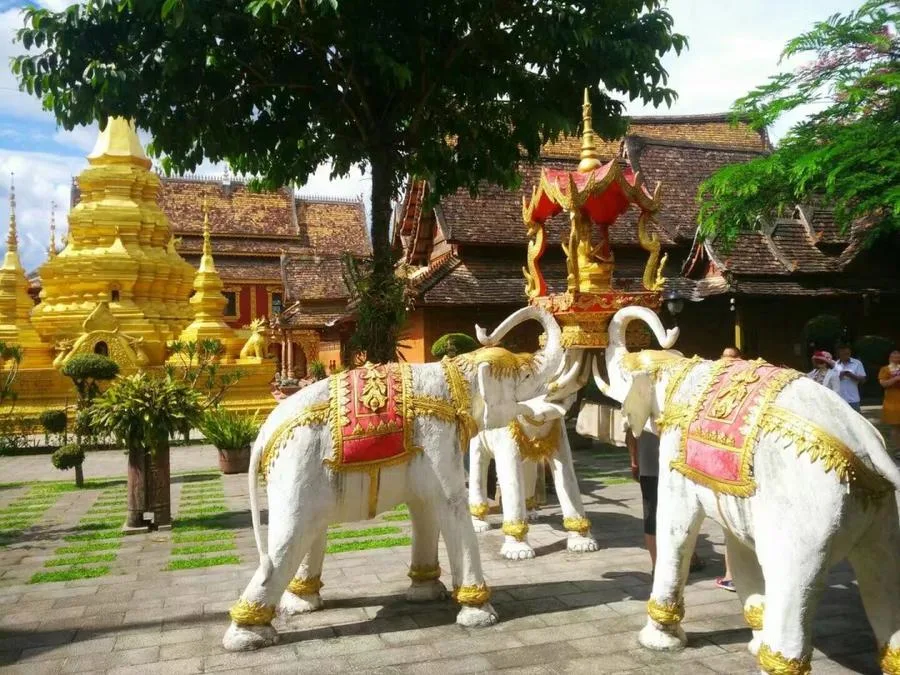
The Drum Tower is located to the right of the main hall and has a distinctive design. The tower features a four-tiered roof, with a small pagoda constructed on top. Inside, a large drum is placed. In the open space in front of the Drum Tower, three white stone elephants are sculpted, collectively supporting a golden statue of the “Four-Faced Buddha.” This unique figure is characteristic of Theravada Buddhism and is believed to be a deity that grants all wishes, overseeing all aspects of human affairs. The Four-Faced Buddha has four faces, each facing a different cardinal direction, representing love, career, health, and wealth. Known for its extraordinary efficacy, the Four-Faced Buddha is one of the most venerated figures in Southeast Asia and Xishuangbanna, attracting numerous devotees.

